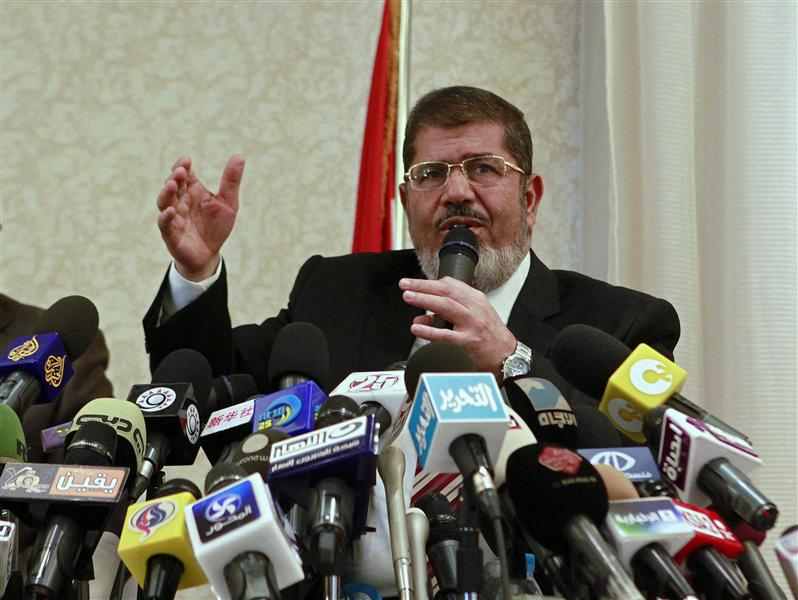Morsi, the Temporary Dictator?
 So far my blogs have covered Syria, Egypt, Sudan, and Libya. This is not to neglect the larger Middle East or to undermine the political will, for example, of those in Bahrain and Yemen who continue to jeopardize their lives for governmental reform. In this piece on Egypt, I hope to emphasize the role that proper follow-through in lawmaking plays in protecting the rights of citizens across the region, including those that continue to peacefully protest today.
So far my blogs have covered Syria, Egypt, Sudan, and Libya. This is not to neglect the larger Middle East or to undermine the political will, for example, of those in Bahrain and Yemen who continue to jeopardize their lives for governmental reform. In this piece on Egypt, I hope to emphasize the role that proper follow-through in lawmaking plays in protecting the rights of citizens across the region, including those that continue to peacefully protest today.
Civilian Rule Returns
President Morsi, formerly dubbed the “replacement candidate” for the Muslim Brotherhood, is slowly consolidating power and rising to his role as President of Egypt. On Sunday he issued a Constitutional Declaration dismissing the chief of armed forces, Field Marshall Mohammed Hussein Tantawi and his chief of staff, General Sami Annan while assuming their powers. He also canceled the Supreme Council of Armed Force’s (SCAF) June 17 constitutional amendment and appointed a vice president. From where did he suddenly get all this power? Egypt has not yet written a constitution to reflect the demands of the revolution, and what is or isn’t politically permissible has, so far, been arbitrarily established.
Egyptians have applauded Morsi’s decision as a move in the right direction in that it has ended the direct political involvement of the ever finicky SCAF. But who’s to say what he’s done is constitutional and within his allotted powers?
There are some, though, who have questioned the legality of Morsi’s extralegal decision. Debates are ongoing as to whether the president had the authority to override the constitutional declaration which had been all but formally upheld by the nation's Constitutional Court. A debate would make sense if there were a law to reference, but gauging the constitutionality of Morsi’s actions without a concrete legal blueprint is illogical.
It seems that this prolonged state of the SCAF and the president establishing “constitutional” amendments was just a trial and error phase to see how far they can each push their rights before having them spelled out in the actual constitution. For now, this game is in Morsi’s favor.
An Imbalance of Power
Morsi has christened himself the “candidate of the revolution,” and while his termination of SCAF rule was a positive step toward establishing civilian rule, his power at the moment places executive, legislative, and judicial forces in his hands.
There is currently no parliament in session (following a June 17 declaration by the SCAF), meaning the legislative power to pass laws are in Morsi's hands. The removal of Tantawi from power only strengthens Morsi's role as the elected leader of the nation.
Most importantly, the powers Morsi assumed on Sunday allow him to select a new panel to write Egypt’s constitution, provided that the current panel cannot complete its work. Unfortunately, should the panel prove to be unrepresentative of the people, it would be difficult to override.
Prior to his inauguration, Morsi promised to install three vice presidents representing Egyptian society: A younger man, a Coptic Christian, and a woman. This promise remains unfulfilled, as his appointment of Mekki, a senior judge, as his vice president only favors the courts. Most of his cabinet has been filled with figures associated with the revolution, but he has yet to bring in representatives from other segments of society.
In his speech at Al-Azhar University on Sunday, Morsi noted that his decision was made for the “best interest of the nation”. If Morsi is actually to keep these interests in mind, he will have to make better decisions in electing a constituent assembly. Some are outlined here by the National Front for Protecting the Revolution. The work of groups like the National Front, which includes renowned Egyptian journalists, academics, and political analysts, keeps Morsi’s powers in check. Hopefully, his quasi-dictatorial powers won’t last long.
